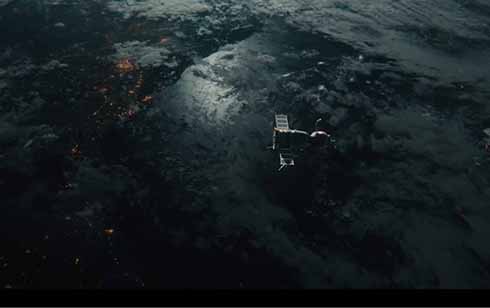 SPUTNIK, Russia, 2020. Starring Oksana Akinshina, Pyotr Fyodorov, Fedor Bondarshuk, Anton Vasili. Directed Egor Abramenko. 113 minutes. Rated MA (Strong science-fiction themes and violence)
SPUTNIK, Russia, 2020. Starring Oksana Akinshina, Pyotr Fyodorov, Fedor Bondarshuk, Anton Vasili. Directed Egor Abramenko. 113 minutes. Rated MA (Strong science-fiction themes and violence)
Older audiences will remember the first probes into space by the Russians, the flight of Sputnik in 1957. Most audiences will remember that there was a long tradition, prior to the Americans, of missions into space, and in the 1960s, the flight of Yuri Gagarin. This film begins in that vein.
All seems normal. Two veterans are returning to earth at the conclusion of their mission. There is tension as well as anticipation of their arrival home. One a family man, the other, the leader of the mission conscious that he has abandoned his young son in order to train and go on the mission. Suddenly, red lights, a malfunction, landing in Kazakhstan, and death and a seriously ill astronaut. Where will this go?
Then, the introduction to the central character, a risk-taking nurse, called before a tribunal to be condemned for her unorthodox methods (even though they succeeded). And the connection? She is met by a colonel who invites her to an elaborate facility in the countryside.
The characters begin to come together, Tatyana invited by the colonel to examine Konstantin, the astronaut, who seems physically well at times, quite unwell at other times – and the screenplay then moves into Alien territory, science-fiction, alien intrusion and taking over humans with dire results.
For those who enjoy this kind of science-fiction, there are some grim and gory moments, but, in Russian mode, it is all to be taken very seriously. How to treat Konstantin? To enable him to remember what had happened in the spacecraft, the use of hypnosis to which he is resistant, Tatyana’s examination and conclusions, the role of doctors, the need for tight security guards, the intentions of the colonel in charge of the process (jingoistic, the alien a possible weapon).
For some audiences, this will be quite absorbing. For others, it may be an experience of simply observing. However, as the revelations continue, there is certainly an invitation for audiences to become involved, as does Tatyana. This is particularly true with some of the revelations of what the colonel is up to in terms of experimentation with the Alien. And, it is interesting how Konstantin is the home for the Alien, it protruding from his mouth, seeking prey, but the astronaut and the alien physically and psychologically connected, sharing and identity.
So, here is a Russian perspective on popular space and monster films of recent decades, tension and drama, some grim moments, but all presented very seriously – no irony, no light touches. And, finally, a shift from scientific observation to a humane involvement, Tatyana and her care for Konstantin but his future thwarted.
Rialto. Released 1 October. VOD, end of October.
Peter Malone MSC is an Associate of Jesuit Media